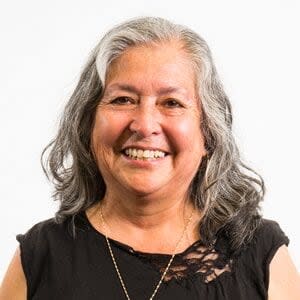This man says moving to Canada was the 'toughest experience ever' with no credit history. So he created an app

- Oops!Something went wrong.Please try again later.
Having lived in more than a dozen countries for work, Nigerian-born Kingsley Madu was familiar with the process of starting over in a new country, but nothing prepared him for what he had to deal with when he immigrated to Canada in 2019.
"It was the toughest experience ever," Madu told CBC News.
From the moment Madu and his family landed at Toronto's Pearson International Airport, he was faced with financial struggles. While he had money, he didn't have any credit.
Now, the Kitchener, Ont., resident is helping others by creating the first BIPOC-focused digital banking app in Canada for newcomers with no Canadian credit history. It will help them rent cars, hotel rooms, homes and apartments while building credit.
"We come from regions of the world where there isn't credit history, but the banking system [in Canada] is asking to see that, and so that is the barrier that does not allow us to gain access to the banking system, to phones, to everything."
Difficult start
When their plane landed in Canada, Madu said, he couldn't even book an Uber to drive his family and their luggage to a hotel because he didn't have a Canadian credit card. Madu ended up paying cash for a limousine.
After arriving at the hotel, he was told that without a credit card, he would have to pay for three nights in advance in order to book a room for one night.
It was the same reason Madu was unable to rent a car and instead had to "walk kilometres to the house where I was hoping to rent."
When Madu got to the home he was interested in renting, the landlord told him he needed to have at least six months worth of credit history.
"At this point, I'm super frustrated," he recalled.
Not knowing where to acquire a credit history, Madu went to the bank, only to be told he would need a home address in order to open a bank account.
App gains momentum
The shock of that first experience in his new country is what led Madu to start working on Expedier, although getting started on the digital banking app was "tough to say the least."
A pivotal turning point came when Madu secured a deal with the Digital Commerce Bank in Calgary.
"That made it a whole lot easier for us to leverage the existing infrastructure and build out," Madu explained.
As the app gained momentum, Madu brokered an agreement with Equifax that is in its final stages. The partnership will allow Expedier users to establish and build credit, access specialized credit and debit cards and transfer money from other countries into their Expedier accounts.
There are other similar apps, like Mogo, that are available to newcomers to help them manage their finances, but the Equifax deal means Expedier will differ in a major way: by allowing payments like rent and debit card purchases to count toward a person's credit history, a feature currently being worked out through the federal government by way of a formal banking licence.
"The rent is a horrible loss for us," said Madu. "It's a double-edged sword loss. We're losing money, cash. We're not building equity. We're not building credit at the same time."
Typically rent payments aren't automatically reported to credit bureaus. You can however sign up for a rent reporting program, like Front Lobby which is offered through the Landlord Credit Bureau, that requires both the landlord and tenant to be involved in the process.
The app's success story continued with Expedier being selected to participate in the Google for Startups Accelerator: Black Founders program earlier this year. It also became a part of the Black ecosystem of Liftoff WR, a Waterloo tech incubator run by the Caribbean Canadian Association of Waterloo Region.
LISTEN | Hear the full interview with Expedier creator Kingsley Madu:
Addressing a gap in the system
Madu's experience immigrating to Canada is a familiar one, said Ana Luz Martinez, settlement program manager at the Kitchener-Waterloo Multicultural Centre.
"What I hear when somebody wants to rent a place, one of the issues that they are dealing with is the credit score. I mean, they don't have any credit history here."
However, Martinez said, there has been a shift in attitude from some banks recently.
"The banks I have seen are more open now to open a bank account for a newcomer. They are actually providing some good offers," he said, adding that's likely because "they want to have customers."

Ana Luz Martinez, settlement programs manager at the KW Multicultural Centre, says she's heard from newcomers trying to rent a home or apartment that it's hard to do without a credit history. (kwmulticultural.ca)
Immigration, Refugees and Citizenship Canada (IRCC) told CBC News it collaborates with both government and non-government partners in the financial sector to advance newcomers' financial literacy skills.
A statement from an IRCC spokesperson said the organization recognizes there are some gaps that need to be addressed.
"As part of its regulatory role, the Financial Consumer Agency of Canada [FCAC] issued a supervisory bulletin that sets out its expectations on how banks can actively support vulnerable consumers, including newcomers, who want to open an account but face barriers in providing standard identification documents, such as utility bills, a driver's licence or passport," the statement said.
The bulletin recognizes that, in certain situations, consumers — including newcomers to Canada — might not have access to the most commonly accepted forms of identification.
It details the FCAC's expectations for banks regarding the use of non-standard ID by consumers who are facing barriers when accessing banking services.
'Phenomenal' feedback
Madu said his app makes it easier for immigrants to ease into the financial landscape and he hopes it helps people start their lives in Canada.
So far, he said, the app has been downloaded more than 10,000 times.
"The feedback has been phenomenal. A lot of people are reaching out saying, 'Hey, what you've built is revolutionary,'" he said.
"Users reach out to us to say, 'I never knew it would be this tough, but because of Ex [Expedier], it's a whole lot easier for me. I'm able to pay tuition, I'm able to pay rentals, I'm able to live my life.' And that's the kind of feedback that we're looking for, to validate what we've built and to ensure that this system keeps working."
For more stories about the experiences of Black Canadians — from anti-Black racism to success stories within the Black community — check out Being Black in Canada, a CBC project Black Canadians can be proud of. You can read more stories here.

(CBC)

